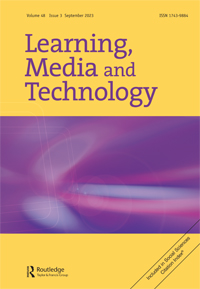Media literacy education nurturing civic participation of disadvantaged youth, or not?
IF 3.1
1区 教育学
Q1 EDUCATION & EDUCATIONAL RESEARCH
引用次数: 3
Abstract
ABSTRACT There has been active debate in recent years whether media literacy education can or even should nurture civic participation. Despite a growing number of theoretical and empirical studies, the question remains unanswered. This paper contributes to the debate with participatory action research conducted with vocational school students in the Czech Republic. Seventeen students aged 17–19 took part in the study over the course of three months. They received weekly interventions applying the citizenship model of media literacy and focusing on ‘create’, ‘reflect’, and ‘act’ competences. The research and educational intervention turned out to be a positive learning experience for students, which exceeded the originally expected outcome. The project found that the students’ immediate media literacy in these competences improved. However, the enhancement of their long-term civic participation remained questionable. This study argues for a student-centered, school-routines-breaking, and hands-on approach to media literacy education supporting civic participation of disadvantaged youth.媒介素养教育是否能培养弱势青年的公民参与?
近年来,媒体素养教育是否能够甚至应该培养公民参与一直存在着激烈的争论。尽管越来越多的理论和实证研究,这个问题仍然没有答案。本文通过对捷克共和国职业学校学生进行的参与性行动研究,为辩论做出贡献。17名年龄在17-19岁的学生参加了为期三个月的研究。他们每周接受媒体素养公民模式的干预,重点关注“创造”、“反思”和“行动”能力。研究和教育干预对学生来说是一种积极的学习体验,超出了最初的预期。该项目发现,学生在这些能力中的即时媒体素养有所提高。然而,加强他们的长期公民参与仍然值得怀疑。本研究主张以学生为中心,打破学校常规,实践媒介素养教育的方法,支持弱势青年的公民参与。
本文章由计算机程序翻译,如有差异,请以英文原文为准。
求助全文
约1分钟内获得全文
求助全文
来源期刊

Learning Media and Technology
EDUCATION & EDUCATIONAL RESEARCH-
CiteScore
11.40
自引率
14.50%
发文量
53
期刊介绍:
Learning, Media and Technology aims to stimulate debate on digital media, digital technology and digital cultures in education. The journal seeks to include submissions that take a critical approach towards all aspects of education and learning, digital media and digital technology - primarily from the perspective of the social sciences, humanities and arts. The journal has a long heritage in the areas of media education, media and cultural studies, film and television, communications studies, design studies and general education studies. As such, Learning, Media and Technology is not a generic ‘Ed Tech’ journal. We are not looking to publish context-free studies of individual technologies in individual institutional settings, ‘how-to’ guides for the practical use of technologies in the classroom, or speculation on the future potential of technology in education. Instead we invite submissions which build on contemporary debates such as: -The ways in which digital media interact with learning environments, educational institutions and educational cultures -The changing nature of knowledge, learning and pedagogy in the digital age -Digital media production, consumption and creativity in educational contexts -How digital media are shaping (and being shaped by) educational practices in local, national and global contexts -The social, cultural, economic and political nature of educational media and technology -The ways in which digital media in education interact with issues of democracy and equity, social justice and public good. Learning, Media and Technology analyses such questions from a global, interdisciplinary perspective in contributions of the very highest quality from scholars and practitioners in the social sciences, communication and media studies, cultural studies, philosophy, history as well as in the information and computer sciences.
 求助内容:
求助内容: 应助结果提醒方式:
应助结果提醒方式:


